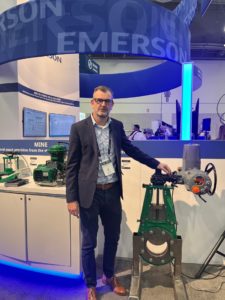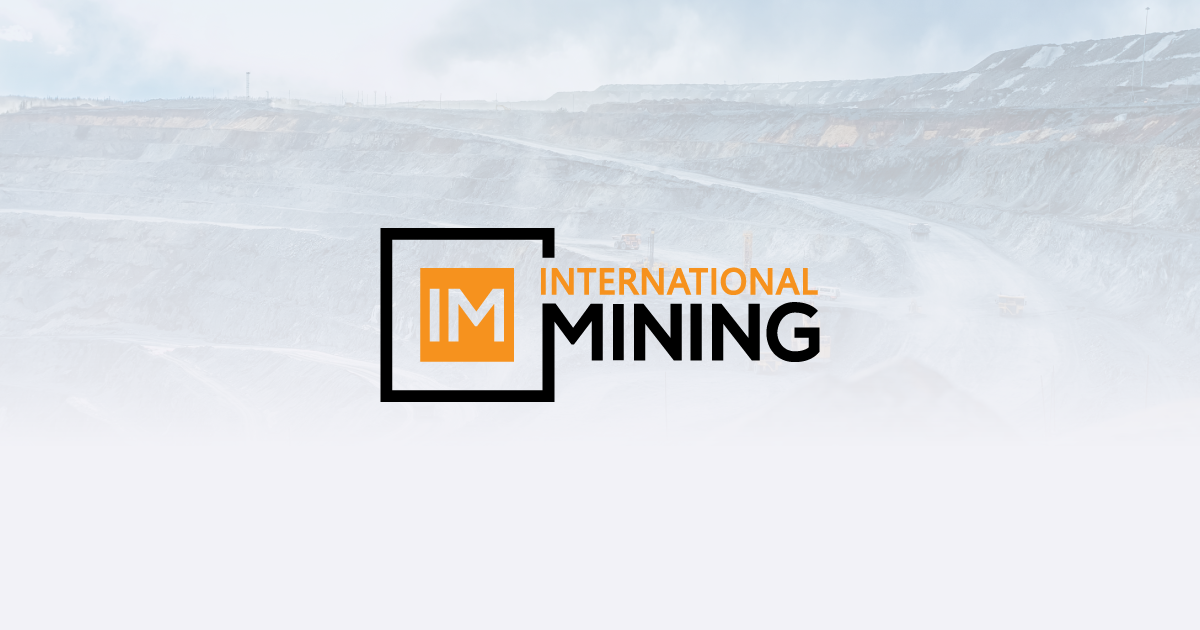During MINExpo 2024, IM Editorial Director Paul Moore sat down with Mike Gordon, Emerson Strategic Business Unit Director – Knife Gate Valves to discuss the uniquely broad role Emerson plays in today’s mineral processing industry. Emerson is one of the few companies in the mineral processing arena that starts all the way back at the field level with field devices and goes right the way through to cloud-based monitoring and maintenance. On the ground this covers a vast array of instruments and analysers to sense all the different parameters – as well as the final control elements, including different types of valves including control and isolation valves.
Mike Gordon, Emerson Strategic Business Unit Director – Knife Gate Valves

Gordon states: “Then we have the next level – including PLCs and edge controllers, and above that the DCS and everything that comes with that. Now, with Emerson also having a controlling ownership share of AspenTech, our offering goes all the way up to the cloud, including cloud-based analytics for predictive maintenance and other purposes. So Emerson brings just about everything that is in a concentrator plant from primary crushing onwards from an automation solutions perspective – so our advantage is in the breadth of our offering, but also our worldwide coverage.”
He added that the Emerson technology stack and the range of flagship product lines is second to none, plus the fact that it makes these available globally through a vast and well-established network. “Our brands are very well known in mining, from Clarkson slurry valves to Rosemount sensors and transmitters, Micro Motion flow meters, Fisher valves, actuators & regulators and DeltaV advanced industrial automation solutions. Most mineral processing plants worldwide will use at least some of these solutions from Emerson.”
Emerson also has a very deep knowledge across different types of mining operations and applications – Gordon says their focus is on helping customers reduce downtime, lower beneficiation costs, and of course keeping operations and the personnel that work there safe. “Gone are the days when mineral processing plants were just about mechanical equipment and black boxes – today sensors and the data extracted from them are absolutely central to success as it helps operations maximise uptime and perfect predictive maintenance. Customers today take all that data and use it to be much more efficient in how they operate the plant. In addition, the more mining companies can utilise the latest smart digital technologies to automate plant processes, the more they can reduce the number of people having to travel to work at remote sites, which provides both cost and safety advantages. Plus the same plant operators can now make good and informed decisions remotely from remote operating centres.”
Are there any particular Emerson solutions that he would single out as being differentiators? “Isolation valves have a big role to play – we have been supplying them for over 50 years and I lead the Clarkson Knife Gate Strategic Business Unit, which lies within the isolation valves portfolio. Their use starts right at the front end of the plant, or even before that if the material is being brought in via hydrotransport of slurry where the pipelines will have isolation valves. In the plant, as soon as you get to the comminution circuit, the valves are there, and then all the way through to the back end and the tailings circuit. Some of them are factored into the initial plant design, generally developed together with an engineering company – others are factored in together with equipment OEMs which might use them as part of cyclone clusters, or separation circuits like banks of flotation cells or thickeners. Our valves see use in the entire plant front to back.”
Simply put, isolation valves provide an on/off capability to stop or start the flow of fluid into a particular area of the plant system, and they are also used in bypass circuits. They often also provide feedback to the control system via inputs to the DCS. “Operators want to know that when a particular valve closes, it will provide full isolation each and every time, and that it will continue to do so up until any planned maintenance periods. So we at Emerson work closely with the customer to make sure that we understand as much as possible their operating regime. From their side they will of course where possible be wanting to push planned maintenance out as far as possible – extending maintenance intervals. From our side we look at the process parameters and make sure we have the right fit for the application and the constraints of the operators. There is no point in putting a class 300 Clarkson valve designed for severe service on a utility water supply line, for example.”
At what point in the flowsheet design does Emerson get involved? Gordon: “We try to influence the specifications of valves used via multiple means whether that is at the EPC/EPCM level, even at the budgetary design phase. Emerson also supplies a lot of software solutions that are used in upfront plant design, as well as simulation for plant design and cost estimation, through to digital twins for when the plant is up and running. At this stage we then assist the customer via our service centres, which we have in all the major mining regions and hubs.”
For most mining companies Emerson already has an existing relationship in some shape or form. “A lot of greenfield and brownfield process plant investment is going on with companies already known to us. So we will be talking to capital projects, reliability and operational teams, as when the project is handed over to the owner, they want to make sure that they can get the support they need for what they’ve got in the field. So overall we try to influence the end users as well as the EPCs.”
What is the Emerson value proposition – quality, reliability, safety, TCO or a combination of these? “All of these, plus on big projects, which most of these process plant projects are, EPCs and owners prefer to deal with as few vendors as possible as it reduces their project costs in the early stages, as well as during start up and commissioning. But it’s also about our deep application expertise across multiple products developed over many years of experience. We continue to develop technologies that extend the life of our products, and by doing that providing customers with a reduction in plant operating costs, but always with a very strong focus on safety. For example, we know that having reliable isolation using valves, each and every time, is crucial. Most safety incidents occur during unplanned maintenance outages – so we continue to develop technology to stop that from happening.”
As stated, extending maintenance intervals, while at the same time making maintenance predictive, are key focus areas today. Emerson offers Fisher™ FIELDVUE™ digital valve controllers, which are microprocessor-based devices mounted right on the valve that can control the flow, adjust the position of the valve based on the flow rating and also send a lot of data back into the DCS. Plus, it tells you right at the source about any issues that need addressing. “There are a lot of smarts now moving down to the field level in mining today for a number of reasons. Plus a lot of what is being achieved in mining today has filtered down from the oil & gas and chemical industries, where it’s been proven in use for decades.”
Emerson has already gone to market on multiple occasions for major mineral processing projects together with AspenTech, offering a comprehensive solution from field instruments right up to the DCS and cloud-based monitoring. “Our global project pursuit teams work very closely together on bringing the customer a complete automation solutions offering – from the ground to the cloud – and a united front. This reduces risk for the customer and ensures they have access to the latest technology.”
From an overall project point of view, Project Certainty is Emerson’s ‘transformational approach’ to enabling top quartile performance in capital projects, including in mining, by digitally transforming the project through modern project management strategies, innovative engineering practices and digital technologies. According to Emerson, this project execution approach delivers solutions that eliminate costs, reduce complexity, and accommodate change to improve capital efficiency and deliver more reliable project schedules.




